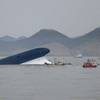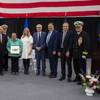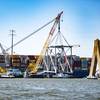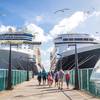"Ship efficiency is a question of perspective", this is one conclusion of the two-day expert conference of the German Society for Maritime Technology on "How to make ships more efficient?". More than 150 participants from all over the world attended the first international conference on ship efficiency in Hamburg. Increasing fuel prices and strong environmental concerns have initiated the high ranking forum of naval architects, ship engineers, ship owners, ship builders, maritime institutions and suppliers, classification societies, financial analysts investors, academics and media representatives. Participants came from Australia, Denmark, Indonesia, Italy, Iran, Norway, Sweden Finland, Greece, Austria, Switzerland, UK, India, Korea and the US.
Seventeen presentations illustrated how commercial sea going ships could be designed, equipped and operated to burn less fuel. While the focus of each individual presentation highlighted specific perspectives the overall petitum of the conference was clear. Dr Hermann J. Klein, president of the German Society for Maritime Technology pointed out in his introduction: "Shipping is the most eco-friendly means of transport. The public image, though, is somewhat different. Rising fuel prices, increasing emissions and the continuous lack of well-trained staff hit the news on a daily basis. As engineers, it is not only our task to set this record straight, but to convince: by developing intelligent and efficient solutions, by making shipping both profitable and environmentally compatible."
Rising oil prices and strict international maritime rules call for a continuous optimization of ship design and operation. Efficient power generation, alternative marine fuels and modern construction will help to reduce emissions substantially.
The conference was subdivided in three thematic topics on ship operation, ship design, future fuels and efficient power.
It was Peter Nielsen from Wallenius Marine AB in Stockholm who pointed out, what was relevant for a shipbuilder and ship owner in respect of eco-friendliness. Objectives like increased capacity, reduced fuel consumption, increased safety as well as improved working conditions and minimised environmental impact are the predominant aspects, when planning a new vessel.
The role of port to improve ship efficiency was highlighted by Wolfgang Hurtienne, Director of the Hamburg Port Authority. He suggested to streamline the flow of information to improve ship calls. Delays due to late departure at previous ports, tidal restrictions, weather conditions or technical problems as well as occupied berths could be resolved by a better information chain involving the ship owner agent, terminals, line runner, harbour masters office, tug assistance and pilots.
Dr. Pierre C. Sames, responsible for strategic research at Germanischer Lloyd put new safety regulations into perspective and answered the question how they could be applied more economically. He pointed out that the new coating performance standard, ballast water management, fuel tank protection, SECA requirements and ship recycling underlined the necessity to reduce the risks or to minimise the environmental impact of shipping. Rule compliance requires new documentation and procedures to keep data updated. Classification societies can help shipping lines to transform new rules into competitive advantages for their clients.
The second conference day covered future fuels and efficient power. Prof Dr Horst Rulfs, Technische Universität Hamburg-Harburg, predicted a further deterioration of fuel quality, a higher contamination with burnable waste products. Charterers tend to purchase always the cheapest fuel which has to be processed by cost oriented designs of fuel systems. The increasing incompatibility of different fuel batches added to significant adjustment problems in engine management. Stricter environmental standards on sulphur contents require different types of fuel in specific water regions. Engine inspection and maintenance routines would also have to be adjusted to mitigate any adverse impact on the engine that comes from consuming different types of fuels. A holistic approach helps ship operators plan and co-ordinate the demands of environmental regulations with other operational concerns to bring about smooth, safe and cost-effective vessel operations.
Timothy Gunner, Technical consultant for INTERTANKO, explained the influence of environmental legislation on the efficiency of ship operation. His personal views were based on the necessity to protect the maritime environment. International regulations should meet long term goals. They should be achievable and consistent to allow for planning and to allow for operational practicalities. He insisted that international regulations should maintain a level playing field for all ships worldwide. Regional regulations should be avoided as they create many operational and planning difficulties and uncertainties. He questioned some of the currently discussed conventions such as the ballast water regulations or oil pollution regulations. There are inadequate reception facilities for oil slumps in many ports.
Summing up the conference Dr Hermann J. Klein underlined the necessity to meet every second year to monitor the progress made in improving ship efficiency and reducing the environmental implications of shipping even further.
Sponsored Content
Chris-Marine’s solutions help to prolong engine lifetime

AST is now AST Networks, bringing you remote connectivity wherever you are

March 2024
 Read the Magazine
Read the Magazine

 Read the Magazine
Read the Magazine
This issue sponsored by:

SMM – “the United Nations of Shipbuilding” – Returns to Hamburg in 2024
Subscribe for
Maritime Reporter E-News
Maritime Reporter E-News is the maritime industry's largest circulation and most authoritative ENews Service, delivered to your Email five times per week












